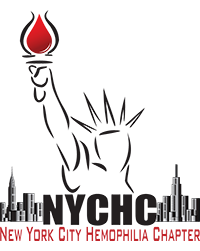Inhibitor Resources Guide 2017
(This content was originally published in the PEN (Parent Empowerment Newsletter) by LA Kelly Communications.)
inhibitor insights
sponsored by Novo Nordisk Inc.
Inhibitor Resources Guide 2017
Paul Clement
People with inhibitors greatly need educational materials: to help them learn to manage their condition effectively, and to minimize the impact of secondary complications such as joint damage. Here are resources, some not mentioned in PEN’s feature article, produced especially for people with inhibitors.
BOOKS
A must-read for anyone with inhibitors is our own Managing Your Child’s Inhibitor: A Practical Guide for Parents. This 279-page book is free to inhibitor families. Not only is it the most comprehensive book available on inhibitors, with in-depth coverage of everything you need to know, but it’s the only book written from the point of view of parents and patients—and in clear, understandable language.
Canadian Hemophilia Society (CHS) has two books available for download: the 62-page All About Inhibitors and the 93-page
Challenges, Choices and Decisions: A Guide on Orthopedic Surgery for People with Hemophilia and Inhibitors.
And don’t forget children’s books on inhibitors! Designed to help familiarize children with their bleeding disorder, these books will also encourage parent-child discussion about coping with the disorder. Read our review of The Great Inhibinator on page 13.
And a great combination comic book and coloring book is Summer Fun with Jake and Alex: An Activity Book for Kids with Inhibitors. This colorful 28-page book tells the story of two brothers, Jake and Alex, who both injure a joint. Jake gets better after a factor infusion, but Alex does not. Alex learns he has an inhibitor and will need a different type of treatment. The book includes guidance for parents on talking to children about inhibitors.
WEBSITES
Several websites provide information to parents and individuals with hemophilia and inhibitors. Most are run by bleeding disorder advocacy organizations, pharmaceutical companies, or government health agencies. One caveat: although most pharma company websites provide a balanced view, others are thinly veiled marketing tools. Look for the sponsoring organization when reading info online: if the organization is in the business of selling products to consumers, be wary of
bias. Detecting bias may not be easy—some websites are “unbranded” and may not mention their products or even the company name. This tactic can be used to mislead the reader.
National Hemophilia Foundation (NHF) is your go-to source for inhibitor information. Find basic inhibitor info for consumers and healthcare providers on the “Inhibitors and Other Complications” webpages. Facts about Inhibitors (2009) can be downloaded from HANDI, NHF’s information resource center. NHF also hosts several programs, including Active Inhibitor Education Workshops. Inhibitor Education Summits, for people with inhibitors, cover most travel expenses for participants. These summits, usually held twice a year, are the only national educational forums for inhibitor patients to meet and learn about their rare complication. NHF also hosts Regional Inhibitor Education Conferences, where you can get together with healthcare professionals for a weekend of education to improve your health and quality of life; and free Inhibitor Education Webinars on advocating for your child, dealing with difficult bleeds, understanding disclosure, and fostering independence. And don’t forget to search past issues of NHF’s magazine, HemAware, for articles on inhibitors.
Hemophilia Federation of America (HFA) provides inhibitor info under “Inhibitor” in the“Bleeding Disorders” section of the website. Find recent news articles on inhibitors by searching for inhibitors under the “News and Stories” page. And under “Programs and Services,” in the “Helping Hands” section, look for “Inhibitor Support.” This HFA program provides inhibitor families with educational, travel, medical transportation, and tutoring/educational supplies.
World Federation of Hemophilia (WFH) has inhibitor information for consumers on its “About Bleeding Disorders” webpage. Select “Resources” to find links to downloadable booklets, including the 10-page Dental Management of Patients with Inhibitors to Factor VIII or Factor IX (2008); 9-page Inhibitors in Hemophilia: A Primer (2008); and 16-page What Are Inhibitors? (2009).
Centers for Disease Control and Prevention (CDC) has inhibitor info webpages and fact sheets on inhibitors, including “Have a Bleeding Disorder? Get Tested Regularly for an Inhibitor” and “Beyond Diagnosis: Treatment Options and Resources for People with Inhibitors” (find these in the “Free Materials” section). A wealth of statistical info on hemophilia and inhibitors is available, collected through the CDC’s hemophilia surveillance programs such as the Universal Data Collection System (which ended in 2011) and its replacement program, Community Counts.
Know Inhibitors is an unbranded website supported by Shire, containing a ton of info on inhibitors: FAQs, videos, and other inhibitor-related resources. One thing that sets this website apart from others is the substantial amount of info on the psychological aspects of dealing with inhibitors. The website has separate sections on the mental health of caregivers as well as teens and adults with hemophilia and inhibitors.
FEIBA.com is Shire’s branded FEIBA webpage. It contains FEIBA product info, but includes many resources (mainly on healthcare and insurance) for people with inhibitors: click on the “Community” and “Tools and Resources” links.
Inhibitorinfo.com is a non-branded website sponsored by Grifols Biologicals, Inc. Although it offers a few resources for people with inhibitors, this website is currently a promotional tool for the SIPPET study (Survey of Inhibitors in Plasma Products Exposed Toddlers), which found that plasma-derived clotting factor concentrates have a lower incidence of inhibitors as compared to recombinant clotting factor concentrates.
Novo Nordisk provides a variety of resources for inhibitor patients. Do a web search to locate the downloadable 13-page booklet Your Resource Guide to Help Care for Inhibitors. Find more inhibitor info in the “Living Well with Inhibitors” section of the “Support, Stay Educated, Community University” webpage on the NovoSecure website. Unlike other websites with inhibitor info, this site requires you to enroll to view its resources.
The resources reviewed here are the best and most informative for people with inhibitors, but we haven’t covered every page of every website that mentions inhibitors. If you know of additional resources that deserve mention, please share them with us. And don’t forget to read the Headlines column in each PEN issue, where we highlight new resources and websites as they come online!

